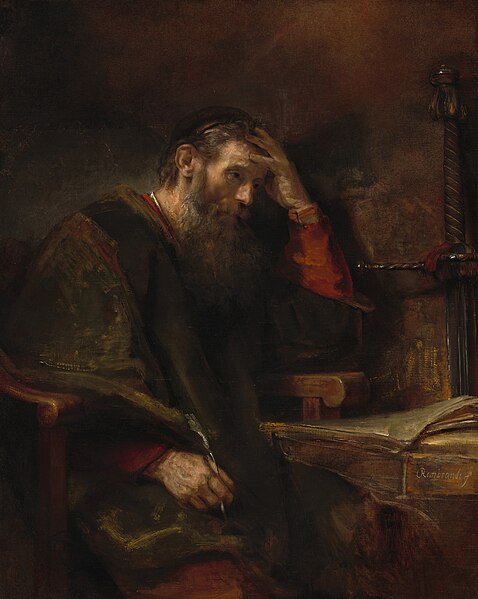Supersessionism, also called replacement theology, is the Christian doctrine that the Christian Church has superseded the Jewish people, assuming their role as God's covenanted people, thus asserting that the New Covenant through Jesus Christ has superseded or replaced the Mosaic covenant. Supersessionists hold that the universal Church has become God's true Israel and so Christians, whether Jew or gentile, are the people of God.
Paul the Apostle is often cited by those who believe that Jewish law is no longer valid.
Paul the Apostle, by Rembrandt Harmensz van Rijn c. 1657
Justin Martyr considered Christians the true spiritual Israel.
Pope Pius XII held supersessionist views.
Jews as the chosen people
In Judaism, the concept of the Jews as chosen people is the belief that the Jews as a subset, via partial descent from the ancient Israelites, are also chosen people, i.e. selected to be in a covenant with God. Israelites being properly the chosen people of God is found directly in the Book of Deuteronomy 7:6 as the verb baḥar (בָּחַר), and is alluded to elsewhere in the Hebrew Bible using other terms such as "holy people" as goy or gentile, Book of Exodus 19:6. Much is written about these topics in rabbinic literature. The three largest Jewish denominations—Orthodox Judaism, Conservative Judaism and Reform Judaism—maintain the belief that the Jews have been chosen by God for a purpose. Sometimes this choice is seen by believers as charging the Jewish people with a specific mission—to be a light unto the nations, and to exemplify the covenant with God as described in the Torah.
Prophet Amos as depicted by Gustave Doré
Monument to Maimonides in Córdoba, Spain
The Jewish Theological Seminary of America, the main rabbinical seminary of Conservative Judaism
Rabbi Menachem Mendel Schneerson, the "Lubavitcher Rebbe"








